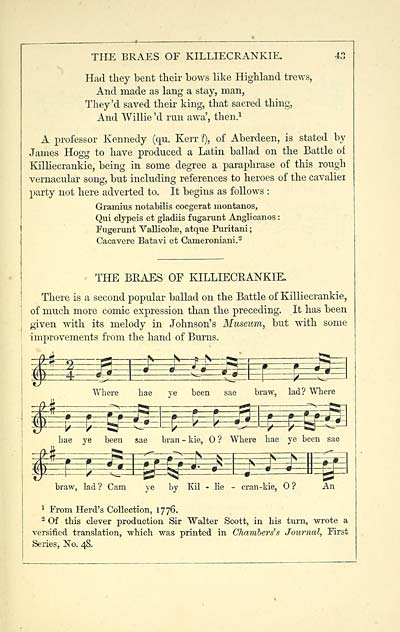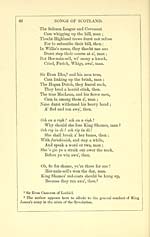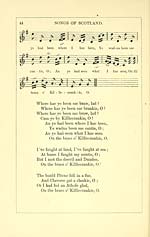Glen Collection of printed music > Printed text > Songs of Scotland prior to Burns
(47) Page 43 - Braes of Killiecrankie
Download files
Complete book:
Individual page:
Thumbnail gallery: Grid view | List view

THE BRAES OF KILLIECRANKIE.
43
Had they bent their bows like Highland trews,
And made as lang a stay, man,
They'd saved their king, that sacred thing,
And Willie 'd run awa', then. 1
A professor Kennedy (qu. Kerr ?), of Aberdeen, is stated by
James Hogg to have produced a Latin ballad on the Battle of
Killiecrankie, being in some degree a paraphrase of this rough
vernacular song, but including references to heroes of the cavaliei
party not here adverted to. It begins as follows :
Gramius notabilis coegerat montanos,
Qui clypeis et gladiis fugarunt Anglicanos :
Fugerunt Vallicolse, atque Puritani ;
Cacavere Batavi et Cameroniani. 2
THE BRAES OF KILLIECRANKIE.
There is a second popular ballad on the Battle of Killiecrankie,
of much more comic expression than the preceding. It has been
given with its melody in Johnson's Museum, but with some
improvements from the hand of Burns.
g =j g_LjUtj £35
£
$
When
hae ye been sae braw, lad? Wh(
^m
$=^tE$E£
p
hae ye heen sae bran - kie, ? Where hae ye been
ve bv Kil - lie - cran-kie, ? An
J
braw. lad? Cam
1 From Herd's Collection, 1776.
2 Of this clever production Sir Walter Scott, in his turn, wrote a
versified translation, which was printed in Chambers's Journal, First
Series, No. 48.
43
Had they bent their bows like Highland trews,
And made as lang a stay, man,
They'd saved their king, that sacred thing,
And Willie 'd run awa', then. 1
A professor Kennedy (qu. Kerr ?), of Aberdeen, is stated by
James Hogg to have produced a Latin ballad on the Battle of
Killiecrankie, being in some degree a paraphrase of this rough
vernacular song, but including references to heroes of the cavaliei
party not here adverted to. It begins as follows :
Gramius notabilis coegerat montanos,
Qui clypeis et gladiis fugarunt Anglicanos :
Fugerunt Vallicolse, atque Puritani ;
Cacavere Batavi et Cameroniani. 2
THE BRAES OF KILLIECRANKIE.
There is a second popular ballad on the Battle of Killiecrankie,
of much more comic expression than the preceding. It has been
given with its melody in Johnson's Museum, but with some
improvements from the hand of Burns.
g =j g_LjUtj £35
£
$
When
hae ye been sae braw, lad? Wh(
^m
$=^tE$E£
p
hae ye heen sae bran - kie, ? Where hae ye been
ve bv Kil - lie - cran-kie, ? An
J
braw. lad? Cam
1 From Herd's Collection, 1776.
2 Of this clever production Sir Walter Scott, in his turn, wrote a
versified translation, which was printed in Chambers's Journal, First
Series, No. 48.
Set display mode to: Large image | Transcription
Images and transcriptions on this page, including medium image downloads, may be used under the Creative Commons Attribution 4.0 International Licence unless otherwise stated. ![]()
| Special collections of printed music > Glen Collection of printed music > Printed text > Songs of Scotland prior to Burns > (47) Page 43 - Braes of Killiecrankie |
|---|
| Permanent URL | https://digital.nls.uk/90576302 |
|---|
| Description | Scottish songs and music of the 18th and early 19th centuries, including music for the Highland bagpipe. These are selected items from the collection of John Glen (1833 to 1904). Also includes a few manuscripts, some treatises, and other books on the subject. |
|---|
| Description | The Glen Collection and the Inglis Collection represent mainly 18th and 19th century Scottish music, including Scottish songs. The collections of Berlioz and Verdi collected by bibliographer Cecil Hopkinson contain contemporary and later editions of the works of the two composers Berlioz and Verdi. |
|---|

